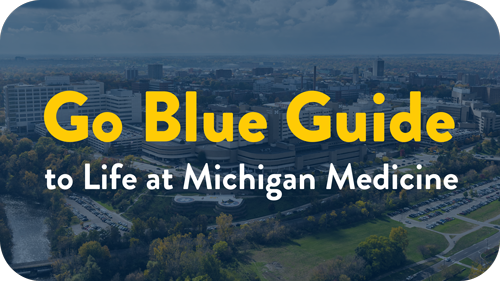Our program aims to:
- Foster an environment of diversity and inclusion.
- Prepare residents for a future practice of dermatology based on the virtues of compassionate care and sound clinical judgment.
- Expose residents to the most complex facets of medical and surgical dermatology, ensuring that graduates are well-prepared to face any aspect of future practice or training.
- Support residents in their scholarly interests and research activities by leveraging our rich research infrastructure to allow for scientific exploration and advancement.
- Teach residents to critically evaluate scientific evidence and cultivate a discipline of life-long self-directed learning.
- Furnish residents with tools to teach others effectively and become excellent educators.
Teaching Opportunities
Residents have the opportunity to teach U-M Medical School students and visiting students from other medical schools through bedside instruction and formal didactic lectures. Beginning in the second year, residents begin to lead journal club discussions and textbook discussions. Learn more about mentorship and teaching through the MENTOR Video Series YouTube.
Evaluation
To ensure that participants acquire adequate knowledge and develop their technical skills, participants' performance is monitored carefully throughout residency training. Residents are evaluated formally by supervising faculty members. Residents also evaluate the faculty regularly to ensure that educational needs are being met. The evaluation process assesses the ACGME core competencies.
Career Development
Residents meet periodically with various faculty members, administrators and the program director to discuss professional goals. UMHS recruits many of its staff physicians from its own training programs.
Practice Management and Improvement
Administrative, regulatory, ethical, and legal issues are major aspects of medicine today and are covered continually during clinics and in conferences. As a U-M Dermatology resident you will learn how to work on practice-based improvement projects through participation in departmental administrative activities and work groups. Residents participate in a longitudinal quality improvement program and work on group quality improvement initiatives each year. Practice management discussions teach administrative aspects of the department. In these sessions, you will explore various topics including the challenges of managing a University department as well as issues related to private practice management.
Research Commitment
Dermatology residents are encouraged to collaborate with clinical faculty to develop clinical case reports and case reviews, retrospective studies, and clinical research projects.
All 3rd year residents spend dedicated time in our Program for Clinical Research in Dermatology (PCRiD); this is a unique opportunity for residents to serve as sub-investigators on sponsored and departmental clinical research trials, learning how to use various clinical research tools (PASI, EASI, PGA, etc) and learning how to consent, screen, and evaluate research participants.
Our residents' success in their research endeavors is evident in the publications and presentations related to their efforts. Residents are encouraged to submit abstracts for presentation at national meetings; all residents are expected to prepare at least one case write-up for our regional Michigan Dermatological Society Meeting each year.
For residents with strong research and academic interest, our T32-funded Training Program in Cell and Molecular Dermatology allows residents to pursue intensive research training. Residents spend the first two years (PGY-2 and PGY-3) pursuing clinical training in dermatology. In the PGY-4 year, residents spend ¼ of their time in the clinic and ¾ of their time in the lab. These residents graduate after 3 years and spend a final year as a research fellow with appointment as a clinical instructor in the department, having one clinic each week and spending the remainder of their time doing research.



